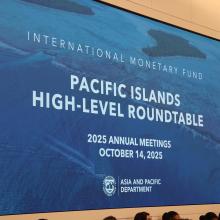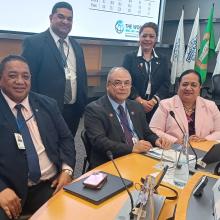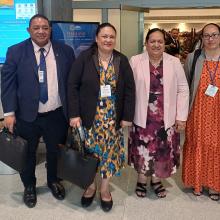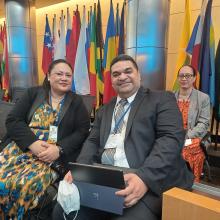









Press Release
The Prime Minister of the Kingdom of Tonga, Hon. Dr. ‘Aisake Valu Eke, participated as one of the key speakers at the Pacific Islands High-Level Roundtable held on the second day of the 2025 World Bank–International Monetary Fund (IMF) Annual Meetings in Washington, D.C.
The roundtable was chaired by Ms. Kristalina Georgieva, Managing Director of the IMF, and co-chaired by Mr. Bo Li, Deputy Managing Director for the IMF Asia and the Pacific Department. In her opening remarks, Ms. Georgieva reaffirmed the Fund’s commitment to supporting Pacific Island countries (PICs) in addressing fiscal challenges, managing high public debt, stabilizing interest rates, and fostering sustainable growth through human capital investment, infrastructure development, and sound fiscal management.
Five Pacific Island countries—Fiji, Palau, Papua New Guinea, Solomon Islands, and Tonga—were invited to speak on Climate Adaptation and Finance. Discussions focused on key regional challenges including public finance sustainability, limited access to climate adaptation finance, and payment system - high remittance costs exacerbated by declining correspondent banking relationships.
In his intervention, Prime Minister Eke acknowledged the continued support of the IMF and the Pacific Financial Technical Assistance Centre (PFTAC) to the region, and emphasized the need for more accessible and predictable climate finance. He noted that Pacific countries receive only around 1 percent of global climate adaptation funding, calling for change to make a difference through considered increase climate adaptation allocation and strengthened mechanisms that align with the region’s urgent climate adaptation needs. The Prime Minister also highlighted regional initiatives such as the Pacific Insurance and Climate Risk Initiative (PICRIC) and the Pacific Resilience Fund (PRF), to be hosted in Tonga, as key tools to enhance resilience and financial preparedness.
Dr. Eke further raised the issue of high remittance costs—averaging 7.3 percent for sending USD 200, the second highest globally—and cautioned that the upcoming 1 percent U.S. levy, effective January 2026, could place additional strain on remittance-dependent economies. He called for continued engagement from the Fund to identify solutions that safeguard Pacific livelihoods.
In closing, Ms. Georgieva recognized the limited share of climate adaptation financing available to Pacific nations and expressed the Fund’s intention to collaborate with the World Bank and other multilateral partners to develop innovative financial instruments and strategies to address the region’s priorities.
– End –
- Log in to post comments

